fewer,less,more的不不同用法
限定词(some,any,many,much, more,most, lots, few, little

the more…, the more…越…,就越...
The more I thought about it, the less I liked the idea
more and more + adj./ adv.越来越…
Changan Avenue is getting more and more beautiful.
a little (+ n.)一点儿,少量(= not much),修饰不可数名词
Ilikealittle butter on my bread.(=Idon’t like much butter on my bread.)
a few of + n.一些、几个
Let me briefly highlight a few of the achievements of the past year.
Many people took part in 10,000-metre race, but only a number of them kept on running to the end.
many/much
many/muchadj. (more/most)
可以在前面接very, so, too等词修饰。
The situation has improved very little.
a few/a little
a few (+ n.)一些、几个(= not many),修饰复数名词,比few表示的数量要多。
Only a few stayed for dinner.
Jane knows a few people in Shanghai.(= Jane doesn’t know many people in Shanghai)
人教版英语八年级上册 Unit 7-专题讲解:掌握moreless,morefewer的用法

单位名称
填写时间
2020.8.20
学科
初中英语
年级/册
八年级上册
教材版本
人教版
课题名称
Unit7.Will people have robots?
难点名称
掌握more/fewer;more/less的用法
难点分析
从知识角度分析为什么难
more和less本身对于学生来说是比较级的难点,而本课新增加了他们修饰名词的用法,more又比较特殊,所以讲清楚more和less的用法对老师的基本功是一个考验。所以我编了口诀来方便学生们记忆。
作形容词,根据more的原级引出many/much,用以解释他既可以修饰可数名词又可以修饰不可数名词
2.less的两种用法:
作副词,修饰部分双音节词和大部分多音节词adj/adv的比较级的修饰部分,举例呈现;
作形容词,根据less的原级引出little,用以解释它可以修饰不可数名词。
3.fewer 的一种用法
作形容词,根据fewer的原级引出few,用以解释它可以修饰可数名词。
最后总结出口诀
不可少less,
可少fewer,
可不可多more
课堂练习
(难点巩固)
分两个部分练习
1,选词填空。结合口诀和语境选择。
2,选择题,结合口诀和语境选择。
小结
知识如果知识一味的照搬,就会失去活力,在教学中要学会做有心人,善于学习,思考,所以口诀学习感叹句对于初中生来说很有意义和好处,最后请同学们将齐读口诀五遍。
教学环节
教学过程
导入
通过“Less is more”的翻译,让同学们分享对这句话的理解,引出more/Less/fewer的用法讲解。
初二英语下册知识点归纳
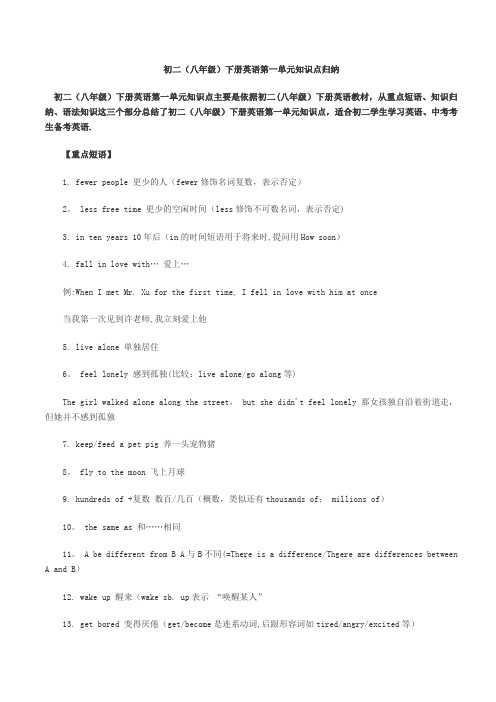
初二(八年级)下册英语第一单元知识点归纳初二(八年级)下册英语第一单元知识点主要是依据初二(八年级)下册英语教材,从重点短语、知识归纳、语法知识这三个部分总结了初二(八年级)下册英语第一单元知识点,适合初二学生学习英语、中考考生备考英语.【重点短语】1. fewer people 更少的人(fewer修饰名词复数,表示否定)2。
less free time 更少的空闲时间(less修饰不可数名词,表示否定)3. in ten years 10年后(in的时间短语用于将来时,提问用How soon)4. fall in love with…爱上…例:When I met Mr. Xu for the first time, I fell in love with him at once当我第一次见到许老师,我立刻爱上他5. live alone 单独居住6。
feel lonely 感到孤独(比较:live alone/go along等)The girl walked alone along the street, but she didn't feel lonely那女孩独自沿着街道走,但她并不感到孤独7. keep/feed a pet pig 养一头宠物猪8。
fly to the moon 飞上月球9. hundreds of +复数数百/几百(概数,类似还有thousands of; millions of)10。
the same as 和……相同11。
A be different from B A与B不同(=There is a difference/Thgere are differences between A and B)12. wake up 醒来(wake sb. up表示“唤醒某人”13. get bored 变得厌倦(get/become是连系动词,后跟形容词如tired/angry/excited等)14. go skating 去滑冰(类似还有go hiking/fishing /skating/bike riding等)15. lots of/a lot of 许多(修饰可数名词、不可数名词都可以)16。
英语比较级的用法
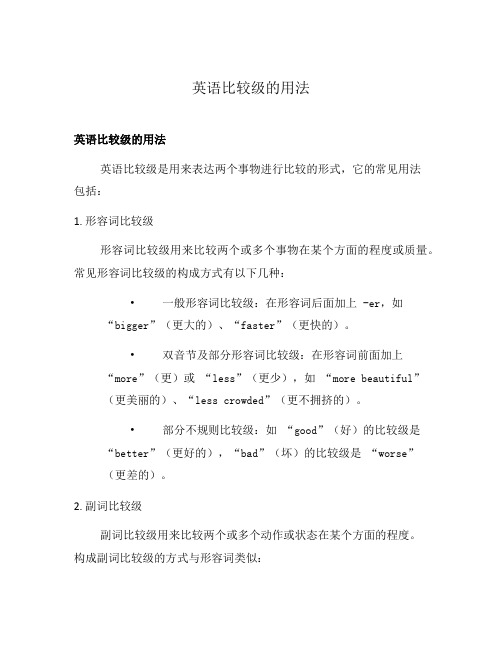
英语比较级的用法英语比较级的用法英语比较级是用来表达两个事物进行比较的形式,它的常见用法包括:1. 形容词比较级形容词比较级用来比较两个或多个事物在某个方面的程度或质量。
常见形容词比较级的构成方式有以下几种:•一般形容词比较级:在形容词后面加上 -er,如“bigger”(更大的)、“faster”(更快的)。
•双音节及部分形容词比较级:在形容词前面加上“more”(更)或“less”(更少),如“more beautiful”(更美丽的)、“less crowded”(更不拥挤的)。
•部分不规则比较级:如“good”(好)的比较级是“better”(更好的),“bad”(坏)的比较级是“worse”(更差的)。
2. 副词比较级副词比较级用来比较两个或多个动作或状态在某个方面的程度。
构成副词比较级的方式与形容词类似:•一般副词比较级:在副词后面加上 -er,如“faster”(更快地)、“higher”(更高地)。
•双音节及部分副词比较级:在副词前面加上“more”(更)或“less”(更少),如“more easily”(更容易地)、“less often”(更少地)。
•部分不规则副词比较级:如“well”(好地)的比较级是“better”(更好地),“badly”(糟糕地)的比较级是“worse”(更糟糕地)。
3. 名词比较级名词比较级主要用于表达两个或多个事物在数量或程度上的差异。
常见的名词比较级用法有以下几种:•比较数量:使用“more”(更多的)或“fewer”(更少的)来表达两个事物数量上的差异,如“more students”(更多的学生)、“fewer cars”(更少的汽车)。
•比较程度:使用“higher”(更高的)或“lower”(更低的)来表达两个事物在程度上的差异,如“highertemperature”(更高的温度)、“lower price”(更低的价格)。
4. 动词比较级动词比较级主要用于比较两个或多个动作或状态在程度上的差异。
morelessfewer简单易懂的用法区别

Tina and Sam are taking about the life at present and the life in
100 years.
Isn't it amusing? Are you interested in it? let's follow them and know more about our life.
典例展示 1.About Population
• Tina: Today, there are so many people all over the world.
• Sam: I think there will be more people in 100 years.
•
many 许多、大量
more 更多,是many的比较级
• A. less; less • C. fewer; less
B. less; more D. fewer; more
•
much 许多,大量
more 更多,是much的比较级
两者都修饰不可数名词pollution
典例展示 3.About Trees, Flowers and birds
• Tina: There are few trees, flowers and birds in my hometown because of the pollution.
•
less修饰不可数名词homework
more 修饰不可数名词time
挑战自我
put the words in the correct columns in the chart
job, people, pollution, robot, fresh water, paper, planet, cars, clean air, city, free time, building, money, tree
less、fewer、lesser的用法比较

s
!
It
’5
t
h
e
P
r 亡,
l
de
n
t
l、 i m
s e
{f
.
,,0
l e 、5
.
天啊
T
居 然 是 急统 本 人
w
e r e
,
h
e r e
,口
l护
55
th
u ),
a
r
ho
J
u s a n
d pe
o
p le
t
he
r e
bu
y [n
g
t
ie k
e
t、
在那里 买 票的不 下
t
e r
m
a n
.
。
从 未 有过 一 位 更 友 好 更 公 正 的 人 而 不能 说
`
:
T
h
e r e
n
e v e r
w
a s
a
m
o r e
k in d
a n
d Ju
s
t
m
a n
.
但 为 r 加 强 句 子 的 语 气 将 作 定 语 用 的形 容 词 比 较 级 形 式 置 于 被 r 修 饰 名 词 之 后 时 我 们 则 又 可使 用 m o 式 比如 我 们 可 以 把 例
《 ( 月刊 ) 英 语知 识 》
1 99 9
年第
期 ( 总第
11
期)
、
、
的
广 东
。
用
法
比
较
庄
艳
在 英 语 中是 一个 常 用词
限定词some,any,many,much,more,most,lots,few,

第二/三…
Canada, the second largest country in the world, lies in the north of America
little/few
little (less/least), few (fewer/fewest)
the most + n.(可数/不可数): 最多/最高的…
the most children最多的孩子
the most trouble最多的麻烦
most+ n.(可数/不可数):大多数的…
most people/most research
most of the +n.(可数/不可数) 大多数的
These?activities?occupied?most?of?her?time.这些活动占用了她大部分时间。
相关搭配:
the more…, the more…越…,就越...
The more I thought about it, the less I liked the idea
more and more + adj./ adv.越来越…
Changan?Avenue?is getting?more?and?more?beautiful.
相关搭配:
at most最多(反义词组at least至少)
It’ll take 20 minutes at the most.?
most 最、非常
Ilike English most/best.我最喜欢英语。
Thank you for a most interesting evening.
初二英语第一单元知识点梳理

初二英语第一单元知识点梳理初二英语第一单元知识点梳理1. fewer people 更少的人(fewer修饰名词复数,表示否定)2. less free time 更少的空闲时间(less修饰不可数名词,表示否定)3. in ten years 10年后(in的时间短语用于将来时,提问用How soon)4. fall in love with… 上…例:When I met Mr. Xu for the first time, I fell in love with him at once当我第一次见到许老师,我立刻爱上他5. live alone 单独居住6. feel lonely 感到孤独(比较:live alone/go along等)The girl walked alone along the street, but she didn’t feel lonely那女孩独自沿着街道走,但她并不感到孤独7. keep/feed a pet pig 养一头宠物猪8. fly to the moon 飞上月球9. hundreds of +复数数百/几百(概数,类似还有thousands of; millions of)10. the same as 和……相同11. A be different from B A与B不同(=There is a difference/Thgere are differences between A and B)12. wake up 醒来(wake sb. up表示“唤醒某人”13. get bored 变得厌倦(get/become是连系动词,后跟形容词如tired/angry/excited等)14. go skating 去滑冰(类似还有go hiking/fishing /skating/bike riding等)15. lots of/a lot of 许多(修饰可数名词、不可数名词都可以)16. at the weekends 在周末17. study at home on computers 在家通过电脑18. agree with sb. 同意某人(的意见)19. I don’t agree. = I disagree. 我不同意20. on a piece of paper 在一张纸上(注意paper/information/news/work/homework/housework等常考到的不可数名词)21. on vacation 度假22. help sb with sth/help sb do sth 帮助某人做某事23. many different kinds of goldfish 许多不同种金鱼24. live in an apartment 住在公寓里/live on the twelfth floor 住在12楼25. live at NO.332,Shanghai Street 住在上海路332号26. as a reporter 作为一名记者27. look smart 显得精神/看起来聪明28. Are you kidding? 你在骗我吗29. in the future 在将来/在未来30. no more=not …anymore 不再(强调多次发生的动作不再发生)I’ll go there no more.31. no longer=not… any longer 不再(强调状态不再发生)32. besides(除…之外还,包括)与except …but(除…之外,不包括)33. be able to与can 能、会l (be able to用于各种时态,而can只能用于一般现在时态和一般过去时态中;have to用于各种时态,而must只能用于一般现在时态)例如:1.I have been able to/will be able to speak two languages. (不可以用can)2. had to stay at home/ will have to (不可以用must)34.be big and crowded 大而且拥挤34. be in college 在上大学35. live on a space station 住在空间站36. dress casually 穿得很随意casual clothing 休闲服饰37. win the next World Cup 赢得世界杯 win award 获僵38. come true 变成现实39. take hundreds of years 花几百年的时间40. be fun to watch 看起来有趣41. over and over again 一次又一次42. be in different shapes 形状不同43. twenty years from now 今后20年【本单元目标句型】1. What do you think life will be like in 1000 years?2. There will be fewer trees、more buildings and less pollution in the future.l fewer; less表示否定之意,分别修饰可数名词和不可数名词;more二者都可以修饰。
辨析lessfewer与more-学易试题君之每日一题君2019学年上学期八年级英语人教版
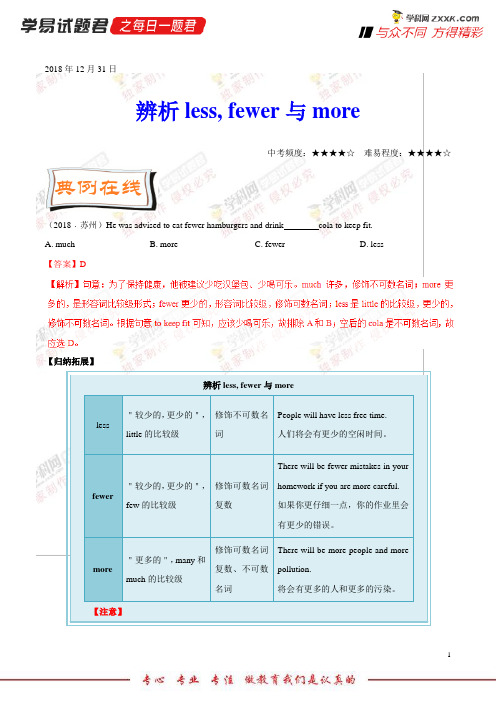
more
"更多的",many和much的比较级
修饰可数名词复数、不可数名词
There will be more people and more pollution.
将会有更多的人和更多的污染。
【注意】
1. less也可作副词,意为"较少地,更少地",常用来修饰形容词、副词或动词。其反义词为more,用法与less相同。
【答案】D
【归纳拓展】
辨析less, fewer与more
le ss
"较少的,更少的",little的比较级
修饰不可数名词
People will have less free time.
人们将会有更少的空闲时间。
fewer
"较少的,更少的",few的比较级
修饰可数名词复数
There will be fewer mistakes in your homework if you are more careful.
2018年12月31日
辨析less, fewer与more
中考频度:★★★★☆难易程度:★★★★☆
(2018﹒苏州)He was advised to eat fewer hamburgers and drinkcola to keep fit.
A. muchB. moreC. fewerD. less
A. fewerB. largerC. moreD. less
2.I spend _______ time on my homework than you do. Maybe you have _______ homework than I do.
A. less; muchB. more;less
more less fewer的区别

more less fewer的区别
一、意思不同
1.more意思:(数、量等)更多的,更大的
2.less意思:(与不可数名词连用)较少的,更少的
3.fewer意思:较少的
二、用法不同
1.more用法:more用作副词是many和much的比较级,可构成多数
两个或两个以上音节的形容词或副词的比较级,但通常不可构成表示方位、绝对或极限意义、时间概念、事物的性质或结构成分、顺序或含明确数学
概念、几何形状或以or结尾等的形容词或副词的比较级。
2.less用法:less是little的比较级,基本意思是“较少的,更少的”,指物体的体积或分量相对于别的物体少。
less用作副词时的意思
是“较少,更少,少”,可用来修饰动词、形容词或副词。
3.fewer用法:意思是“很少的…,几乎没有的…”,表示“虽然有,但很少”,强调“少”,表示否定的意思。
三、后接词不同
1.more后接词:后面可以接可数名词也可以接
不可数名词。
2.less后接词:接不可数名词。
3.fewer后接词:接可数名词。
more less fewer的题

More, less, fewer1. 前言在日常生活中,我们经常会用到more, less, fewer这三个词来表示数量的增加或减少。
然而,很多人对它们的正确用法并不清楚,容易混淆。
本文将深入探讨more, less, fewer的用法和区别,帮助读者更准确地运用这三个词语。
2. more的用法2.1 作为形容词时,more用来表示较多的数量或程度,常用于比较级中。
例如:“She has more apples than I do.”、“I need more time to finish this task.”2.2 作为副词时,more用来表示更多地或更多地做某事。
例如:“He needs to study more to improve his grades.”、“She talks more than she listens.”3. less的用法3.1 作为形容词时,less表示较少的数量或程度,常用于比较级中。
例如:“I have less money than I did last year.”、“She eats less sugar to stay healthy.”3.2 作为副词时,less表示较少地或较少地做某事。
例如:“He works less in the summer.”、“She exercises less than she used to.”4. fewer的用法4.1 fewer是一个形容词,用来表示可数名词的数量较少。
例如:“There are fewer people at the party than I expected.”、“I have fewer books than she does.”4.2 fewer常与可数名词一起使用,用于表示数量上的减少。
例如:“We have fewer students in this class than in the last one.”、“There are fewer cars on the road during the pandemic.”5. 区别与比较5.1 more和less通常用于不可数名词,表示数量或程度的增加或减少。
less和few的用法
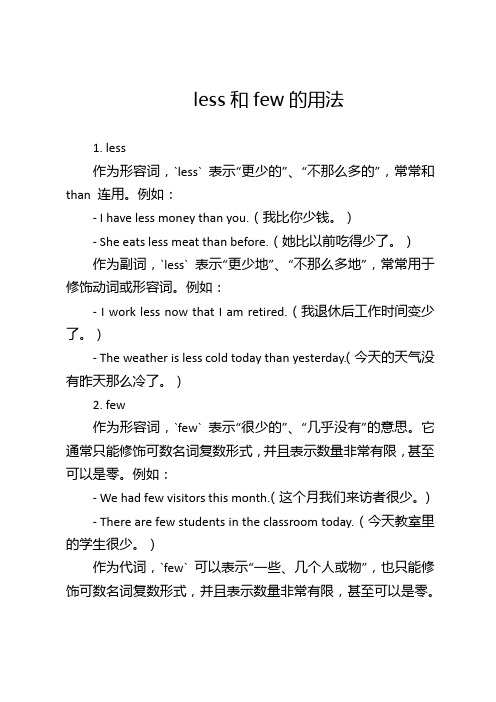
less和few的用法1. less作为形容词,`less` 表示“更少的”、“不那么多的”,常常和than 连用。
例如:- I have less money than you.(我比你少钱。
)- She eats less meat than before.(她比以前吃得少了。
)作为副词,`less` 表示“更少地”、“不那么多地”,常常用于修饰动词或形容词。
例如:- I work less now that I am retired.(我退休后工作时间变少了。
)- The weather is less cold today than yesterday.(今天的天气没有昨天那么冷了。
)2. few作为形容词,`few` 表示“很少的”、“几乎没有”的意思。
它通常只能修饰可数名词复数形式,并且表示数量非常有限,甚至可以是零。
例如:- We had few visitors this month.(这个月我们来访者很少。
)- There are few students in the classroom today.(今天教室里的学生很少。
)作为代词,`few` 可以表示“一些、几个人或物”,也只能修饰可数名词复数形式,并且表示数量非常有限,甚至可以是零。
例如:- Few of the students passed the exam.(只有几个学生通过了考试。
)- There are few apples left on the tree.(树上剩下很少的苹果。
)总结:`less` 和`few` 在单词意义上有不同的用法,需要根据上下文语境来理解其含义。
下面列举了一些更多例子,方便理解。
1. I have less money than you.(我比你少钱。
)2. She eats less meat than before.(她比以前吃得少了。
)3. I work less now that I am retired.(我退休后工作时间变少了。
less的用法及短语

less的用法及短语一、Less的概述及基本用法在日常英语学习中,我们经常会遇到“less”这个单词以及与之相关的短语。
它是一个非常常见的后缀,可以在不同的语境下表示“更少”的意义。
在本文中,我们将详细探讨“less”的用法及相关短语,并展示其在英语表达中的正确应用。
1. “less”作为比较级副词首先,我们来看一下“less”作为比较级副词的用法。
当我们想要对两者进行比较时,可以使用“less”来表达目标物体数量上的减少或降低。
例句:- He has less money than his brother.(他拥有的钱比他哥哥少。
)- This city has less pollution than the capital.(这个城市污染比首都少。
)2. "less"作为形容词除了作为副词之外,“less”也可以作为形容词使用,表示数量或程度上的减少。
例句:- They were less enthusiastic about the idea.(他们对这个主意没那么热情了。
)- I have fewer friends now, so my social circle is smaller.(我现在朋友减少了,所以我的社交圈变小了。
)3. 代替"not as... as"另一个常见的用法是,用“less”来代替“not as... as”结构,在句子中表示较少或较小。
例句:- He is less intelligent than his sister.(他比他妹妹笨一些。
)- The new model is less expensive than the old one.(这个新款的比旧款便宜一些。
)二、常见与“less”相关的短语除了基本用法之外,“less”还可以与其他词组合成各种常见的短语,在不同情境下丰富我们的英语表达能力。
接下来,我们将介绍几个常用的与“less”相关的短语,并给出例句进行解释:1. More or less意为“大致上”,当我们想表达一个近似或估计值时使用。
fewer and fewer用法岛状 -回复
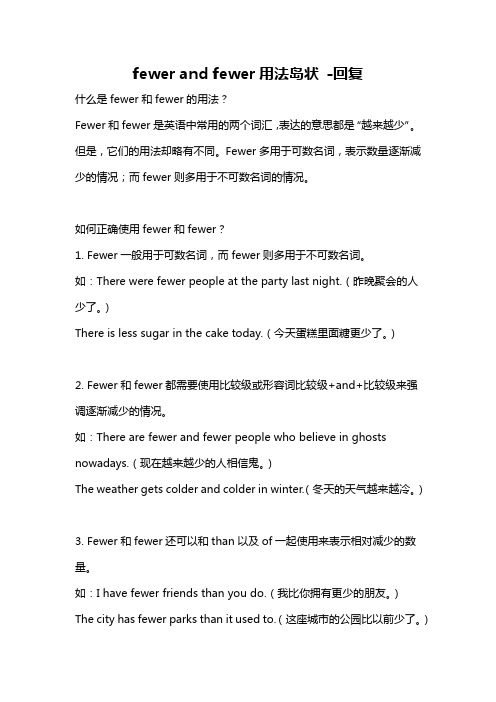
fewer and fewer用法岛状-回复什么是fewer和fewer的用法?Fewer和fewer是英语中常用的两个词汇,表达的意思都是“越来越少”。
但是,它们的用法却略有不同。
Fewer多用于可数名词,表示数量逐渐减少的情况;而fewer则多用于不可数名词的情况。
如何正确使用fewer和fewer?1. Fewer一般用于可数名词,而fewer则多用于不可数名词。
如:There were fewer people at the party last night.(昨晚聚会的人少了。
)There is less sugar in the cake today.(今天蛋糕里面糖更少了。
)2. Fewer和fewer都需要使用比较级或形容词比较级+and+比较级来强调逐渐减少的情况。
如:There are fewer and fewer people who believe in ghosts nowadays.(现在越来越少的人相信鬼。
)The weather gets colder and colder in winter.(冬天的天气越来越冷。
)3. Fewer和fewer还可以和than以及of一起使用来表示相对减少的数量。
如:I have fewer friends than you do.(我比你拥有更少的朋友。
)The city has fewer parks than it used to.(这座城市的公园比以前少了。
)4. 在各种语境中使用fewer和fewer需要注意句子的主语和谓语的一致性。
如:Fewer people are attending the lecture than we expected.(出席讲座的人比我们预期的要少。
)5. 当你不确定使用fewer还是less时,可以通过以下方法来判断:如果你要表达的是“更少”,并且指的是可数名词,使用fewer;如果指的是不可数名词,使用less。
fewer,less,more地不不同用法

----fewer是few的比拟级.用于修饰可数名词.表示更少more既可以表示更多这一含义,也可以辅助其他多音节形容词或副词构成比拟级也是less是little的比拟级,用于修饰不可数名词,义同fewerlittle.表示少到几乎没有,注意与alittle区分fewer是few的比拟级,后面+可数名词more是many和much的比拟级,后面可以跟可数和不可数less是little的比较级,后面跟不可数名词little有多种意思,根据你的题目,在这里它是一点的意思,与few 同意.但little后跟不可数名词,而后者后面跟可数名词区别一alittle和little修饰或代替不可数名词,与much相对,表示“多〞;afew和few修饰或代替可数名词与many相对,表示“少〞。
alittle和afew含肯定语气,little和few含否认语气。
一般说来,在only,just,still,quite,can,not等词后用alittle或afew;在very,so,some,the,no等词后用little或fewmore更多less更少few几乎没有,修饰可数名词复数Therearefewpeoplehere.这儿几乎没人。
little几乎没有,修饰不可数名词Therearelittlewaterinthecup.杯子里几乎没水。
其实你还要注意afew还有alittle跟他们的区别afew一些,修饰可数名词复数Thereareafewpeoplehere.这儿有一些人。
alittle一些,修饰不可数名词Therearealittlewaterinthecup.杯子里有一些水afew,few后面加可数名词alittle,little后面加不可数名词另外:few和little均表否认,而afew和alittle均表肯定,例如:1.Thereareafewbooksonthetable,aren'tthere?2.Therearefewbooksonthetable,arethere?3.Thereisalittlemilk,isn'tthere?4.Thereislittlemilk,isthere?Few-fewer-fewestmany-more-most(修饰可数名词)little-less-leastmuch-more-most〔修饰不可数名词〕Therebe句型的一般将来时:Therewillbe+主语+其他,意为:将会有。
more less fewer的用法及区别
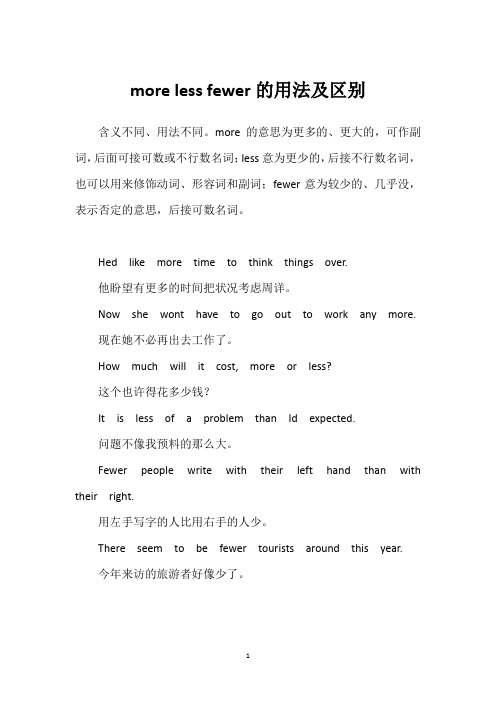
more less fewer的用法及区别含义不同、用法不同。
more的意思为更多的、更大的,可作副词,后面可接可数或不行数名词;less意为更少的,后接不行数名词,也可以用来修饰动词、形容词和副词;fewer意为较少的、几乎没,表示否定的意思,后接可数名词。
Hed like more time to think things over.
他盼望有更多的时间把状况考虑周详。
Now she wont have to go out to work any more.
现在她不必再出去工作了。
How much will it cost, more or less?
这个也许得花多少钱?
It is less of a problem than Id expected.
问题不像我预料的那么大。
Fewer people write with their left hand than with their right.
用左手写字的人比用右手的人少。
There seem to be fewer tourists around this year.
今年来访的旅游者好像少了。
1。
Less与可数名词的连用现象

Less与可数名词的连用现象Less 与可数名词的连用现象一般地讲less是little的比较级,通常用来修饰不可数名词。
但也有与可数名词连用的现象,常见的有下面五种情况:一、名词前有基数词修饰时。
例如:Five more candidates entered this year than last,but three less passed.今年比去年多了五个候选人,通过的却少了三个.Now that the children are away at school, we have two less mouths to feed.孩子们上学去了,所以我们可以少做两个人的饭。
二、名词前有a few修饰时。
这种情况下用less比用fewer恰当.例如:We could do with a few more workers and a few less supervisors.再增加几个工人,减少几个监工也行。
三、在感叹句中常用less,而不用fewer.例如:If only there were less holes!要是窟窿少些该多好啊!四、在表示时间、距离、金钱等的短语中。
这些短语中用less是由于人们习惯于把这些单位作为一个整体看待。
例如:in less than four hours不到四小时less than 100miles不到100英里less than5,000不到5,000美元五、在一些习惯用语中。
说话人使用这些用语时,往往着眼于有事物的大约量,而不去细算精确的数额.例如:You may write a note in fifty words or less.你可以写一张五十字以内的便条。
Last night I read forty pages,more or less.昨天晚上我看了四十页左右.There were no less than sixty wounded.受伤者多达60人.。
语法透视:比较数量的多少和副词比较级及最高级

语法透视:比较数量的多少和副词比较级及最高级一、如何比较数量的多少【教材典句】1. Millie has more tomatoes than Daniel.米莉比丹尼尔的西红柿多。
2. Millie has less rice than Daniel.米莉比丹尼尔的米饭少。
3. Millie has fewer bananas than Kitty.米莉比基帝的香蕉少。
4. Kitty has the most eggs.基蒂的鸡蛋最多。
5. Daniel has the fewest tomatoes.丹尼尔的西红柿最少。
6. Millie has the least juice.米莉的果汁最少。
上面的句子中分别用了more, less, fewer, most, fewest和least对数量进行比较。
【语法全解】1.两者之间数量上的比较(1)可用more...than...结构表示“……比……多”,more后可接可数名词复数或不可数名词。
如:I have more friends than my cousin.我的朋友比我表弟的多。
She has more free time than me.她的空闲时间比我的多。
(2)可用fewer/le ss…than…结构表示“……比……少”,fewer后接可数名词复数,less后接不可数名词。
如:Danny studies fewer subjects than I.丹尼比我学的科目少。
She spends less money on clothes than you.她在衣服上花的钱比你少。
2.三者或三者以上数量上的比较(1)用the most“最多”,它后面既可跟可数名词复数,也可跟不可数名词。
如:Bob got the most points in our class.在我们班里鲍勃得分最多。
Who gets the most money in the world 世界上谁拥有最多的钱(2)用the fewest或the least表示“最少”,前者用来修饰可数名词复数,后者修饰不可数名词。
less的用法
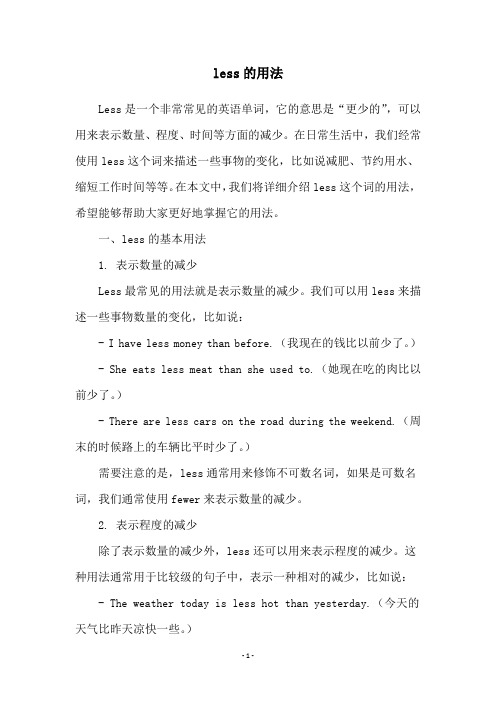
less的用法Less是一个非常常见的英语单词,它的意思是“更少的”,可以用来表示数量、程度、时间等方面的减少。
在日常生活中,我们经常使用less这个词来描述一些事物的变化,比如说减肥、节约用水、缩短工作时间等等。
在本文中,我们将详细介绍less这个词的用法,希望能够帮助大家更好地掌握它的用法。
一、less的基本用法1. 表示数量的减少Less最常见的用法就是表示数量的减少。
我们可以用less来描述一些事物数量的变化,比如说:- I have less money than before.(我现在的钱比以前少了。
) - She eats less meat than she used to.(她现在吃的肉比以前少了。
)- There are less cars on the road during the weekend.(周末的时候路上的车辆比平时少了。
)需要注意的是,less通常用来修饰不可数名词,如果是可数名词,我们通常使用fewer来表示数量的减少。
2. 表示程度的减少除了表示数量的减少外,less还可以用来表示程度的减少。
这种用法通常用于比较级的句子中,表示一种相对的减少,比如说: - The weather today is less hot than yesterday.(今天的天气比昨天凉快一些。
)- His English is less fluent than his Chinese.(他的英语比他的中文不流利一些。
)- The movie is less interesting than I expected.(这部电影比我预期的没那么有趣。
)需要注意的是,这种用法通常用于比较级句子中,表示相对的减少,而不是绝对的减少。
3. 表示时间的减少除了表示数量和程度的减少外,less还可以用来表示时间的减少。
这种用法通常用于描述一些时间的缩短,比如说:- She finished the work in less time than she expected.(她比预期的用了更短的时间完成了工作。
- 1、下载文档前请自行甄别文档内容的完整性,平台不提供额外的编辑、内容补充、找答案等附加服务。
- 2、"仅部分预览"的文档,不可在线预览部分如存在完整性等问题,可反馈申请退款(可完整预览的文档不适用该条件!)。
- 3、如文档侵犯您的权益,请联系客服反馈,我们会尽快为您处理(人工客服工作时间:9:00-18:30)。
区别一a little和little修饰或代替不可数名词,与much相对,表示“多”;a few和few 修饰或代替可数名词与many相对,表示“少”。
a little和a few含肯定语气,little和few含否定语气。
一般说来,在only, just, still, quite, can, not等词后用a little或a few;在very, so, some, the, no等词后用little或few
more 更多less 更少few 几乎没有,修饰可数名词复数There are few people here.这儿几乎没人。
little几乎没有,修饰不可数名词There are little water in the cup.杯子里几乎没水。
其实你还要注意a few 还有 a little 跟他们的区别 a few 一些,修饰可数名词复数There are a few people here.这儿有一些人。
a little一些,修饰不可数名词There are a little water in the cup.杯子里有一些水
a few, few后面加可数名词 a little, little后面加不可数名词
另外:few和little均表否定,而a few和a little均表肯定,例如:
1. There are a few books on the table, aren't there?
2. There are few books on the table, are there?
3. There is a little milk, isn't there?
4. There is little milk, is there?
Few-fewer-fewest many-more-most (修饰可数名词)
little- less- least much-more- most (修饰不可数名词)
There be 句型的一般将来时:
There will be + 主语+ 其他,意为:将会有。
一般疑问句形式为:Will there be + 主语+ 其他。
肯定回答是:Yes, there will. 否定回答是:No, there won’t.
否定形式是:There won’t be + 主语+ 其他,将不会有……
特殊疑问句是: 疑问词/ 词组+ 一般疑问句?When will there be a nice basketball match?。
